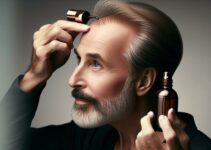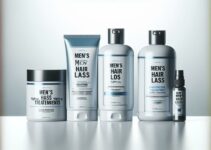If you're one of the 50 million men in the United States experiencing hair loss, you're not alone. Finding effective hair regrowth strategies can be a challenging journey, but there are options available to help you regain confidence and restore your hair. From lifestyle adjustments to advanced medical treatments, understanding the various approaches and their success rates is crucial in making informed decisions about your hair regrowth journey. Let's explore the proven strategies that can make a real difference in your quest to reclaim a fuller head of hair.
Key Takeaways
- Genetics and hormone imbalance are primary causes of hair loss in men.
- Lifestyle changes, including stress management and a balanced diet, can support hair regrowth.
- Essential vitamins and minerals, such as biotin, vitamin D, iron, and zinc, promote hair health and regrowth.
- Topical treatments like minoxidil and finasteride, as well as prescription medications, laser therapy, and PRP therapy, can be effective options for hair regrowth.
Understanding Hair Loss in Men
Understanding hair loss in men requires a comprehensive grasp of the underlying biological processes and contributing factors. Genetics play a significant role in male pattern baldness, with studies showing that the condition can be inherited from either the maternal or paternal side. Hormone imbalance, particularly the overproduction of dihydrotestosterone (DHT), is another primary cause of hair loss in men. DHT binds to hair follicles, causing them to shrink and eventually leading to the cessation of hair growth.
Prevention of hair loss in men often focuses on addressing these genetic and hormonal factors. Medications like finasteride and minoxidil have been proven effective in preventing further hair loss and promoting regrowth by targeting DHT and stimulating hair follicles. Lifestyle adjustments, such as stress management and a balanced diet, can also play a significant role in preventing or slowing down hair loss.
Understanding the causes of hair loss in men is crucial for developing effective prevention and treatment strategies. By addressing genetic predispositions and hormonal imbalances, men can take proactive steps to maintain a healthy head of hair.
Lifestyle Changes for Hair Regrowth
To promote hair regrowth, consider making lifestyle changes that address underlying genetic predispositions and hormonal imbalances, such as stress management and a balanced diet. Lifestyle modifications can play a crucial role in supporting hair regrowth and overall hair health. Here are some key strategies to incorporate into your daily routine:
- Dietary Changes: A diet rich in essential nutrients such as vitamins A, C, D, and E, as well as minerals like iron and zinc, can positively impact hair regrowth. Incorporating foods such as leafy greens, nuts, seeds, fish, and lean proteins can provide the necessary building blocks for healthy hair.
- Stress Management: Chronic stress can contribute to hair loss by disrupting the normal hair growth cycle. Engaging in stress-reducing activities such as yoga, meditation, or regular exercise can help mitigate the effects of stress on hair health.
- Balanced Lifestyle: Adopting a balanced lifestyle that includes adequate sleep, regular physical activity, and limited exposure to environmental toxins can also support overall hair regrowth.
Nutritional Supplements for Hair Health
You can optimize your hair health by ensuring you're getting essential vitamins and minerals through your diet or supplementation. The impact of your diet on hair health is significant, so maintaining a balanced and nutrient-rich diet is crucial. In addition, certain nutritional supplements have been recommended to support hair growth and overall hair health.
Essential Vitamins and Minerals
Nutritional supplements rich in essential vitamins and minerals can significantly support hair health and promote regrowth in men experiencing hair loss. Vitamin deficiencies can contribute to hair loss, making it essential to ensure adequate intake of key vitamins such as biotin, vitamin D, and vitamin E. These vitamins play crucial roles in promoting hair growth and preventing hair thinning. Mineral supplements like iron, zinc, and selenium are also important for maintaining healthy hair follicles and supporting regrowth. Incorporating these essential vitamins and minerals into your daily routine can help address underlying deficiencies and support overall hair health. When choosing regrowth options, consider consulting with a healthcare professional to determine the best combination of nutritional supplements for your specific needs.
Impact of Diet
Incorporating dietary supplements rich in essential vitamins and minerals can have a significant impact on promoting hair health and supporting regrowth in men experiencing hair loss. Your diet significantly influences hair growth and the overall health of your hair follicles. Essential nutrients such as biotin, vitamin D, iron, and zinc play a crucial role in maintaining healthy hair. Biotin, commonly found in foods like eggs and nuts, supports the production of keratin, a key component of hair. Vitamin D, obtained from sunlight exposure and fortified foods, contributes to hair follicle cycling. Iron helps red blood cells carry oxygen to hair follicles, and zinc supports hair tissue growth and repair. Including these nutrients in your diet or through supplements can have a nutritional impact on regrowing hair, promoting thicker, healthier strands.
Recommended Supplements
Having discussed the impact of diet on hair health and regrowth, it is important to consider recommended supplements that can further support these efforts. When it comes to hair health, certain nutritional supplements have been shown to be effective in promoting hair growth and overall hair health. Before incorporating any supplements into your regimen, it's crucial to understand their effectiveness, dosage requirements, and potential side effects.
- Biotin: Known for its role in promoting hair growth and overall hair health.
- Vitamin D: Supports the creation of new hair follicles and may help maintain healthy hair growth.
- Omega-3 Fatty Acids****: Essential for scalp health and may help in reducing hair loss.
Always consult with a healthcare professional before starting any new supplement to ensure it is safe and suitable for your individual needs.
Topical Treatments for Regrowing Hair
When it comes to regrowing hair, topical treatments can be an effective option for many men. These solutions are typically applied directly to the scalp, making it easy to incorporate into your daily routine. As you consider topical treatments, it's important to look for key ingredients that have been shown to support hair regrowth, such as minoxidil and finasteride.
Topical Solutions Overview
Topical solutions are widely used for regrowing hair and have been shown to be effective in promoting hair regrowth for men experiencing hair loss. When considering topical treatments, it's important to understand the various options available. Here's an overview to help you make an informed decision:
- Minoxidil: This FDA-approved topical solution is one of the most popular treatments for hair regrowth.
- Finasteride: Another FDA-approved topical treatment that is effective in preventing further hair loss and promoting regrowth.
- Essential Oils: Natural remedies such as rosemary oil, peppermint oil, and cedarwood oil have shown promise in stimulating hair growth.
It's essential to consult with a healthcare professional to determine the most suitable topical solution for your specific hair regrowth needs.
Application Methods
To effectively apply topical treatments for regrowing hair, it is important to understand and carefully follow the specific application methods recommended for each product. When using hair oils, gently massage the scalp with the fingertips to improve blood circulation and ensure the oil penetrates the hair follicles. Scalp massage can also help in distributing natural oils and enhancing the effectiveness of the treatment. For minoxidil application, part the hair and apply the solution directly to the affected areas, ensuring it comes into contact with the scalp. Additionally, derma rolling can be used to enhance the absorption of topical treatments by creating micro-injuries that stimulate the skin's natural healing processes. Following these precise application methods can maximize the effectiveness of topical treatments for hair regrowth.
Key Ingredients to Consider
Consider the key ingredients in topical treatments for hair regrowth to make informed choices about products best suited for your needs. When selecting a topical treatment for hair regrowth, it's essential to look for key ingredients backed by scientific evidence and clinical research. Natural remedies and herbal remedies have gained popularity in the hair regrowth industry, and some ingredients have shown promising results in promoting hair growth. Keep an eye out for ingredients such as minoxidil, which has been clinically proven to stimulate hair growth. Additionally, look for products containing saw palmetto, a natural extract that may block the enzyme linked to hair loss. Another beneficial ingredient to consider is ketoconazole, which has shown effectiveness in promoting hair growth. These ingredients, supported by scientific evidence, can help you choose the most effective topical treatment for hair regrowth.
Prescription Medications for Hair Regrowth
When seeking prescription medications for hair regrowth, it is essential to consult with a healthcare professional to explore the most suitable options for your individual needs and circumstances. Prescription medications such as finasteride and minoxidil are commonly used to combat hair loss in men. These medications have been shown to be effective in promoting hair regrowth, with finasteride specifically targeting the hormone dihydrotestosterone (DHT) that contributes to hair loss. However, it's important to be aware of potential side effects associated with these medications. For instance, finasteride may cause sexual dysfunction in a small percentage of users, while minoxidil can lead to scalp irritation.
When considering prescription medications, the cost and availability are also important factors to take into account. These medications may require ongoing use, which can result in long-term expenses. Additionally, obtaining these medications often involves a prescription from a healthcare provider, and they may not be covered by all insurance plans.
Laser Therapy for Stimulating Hair Growth
Considering alternative treatments for hair regrowth, laser therapy has gained attention for its potential to stimulate hair growth in men. Laser therapy, also known as low-level laser therapy or red light therapy, works by stimulating hair follicles, increasing blood flow to the scalp, and promoting hair regrowth. Here are some key points to consider when exploring laser therapy as a hair regrowth option:
- Non-invasive treatment: Laser therapy is a non-surgical and non-invasive approach to addressing hair loss, making it a popular choice for individuals seeking alternative options to traditional hair restoration methods.
- Scientific evidence: Research studies have shown that laser therapy can be effective in promoting hair regrowth, particularly in individuals with androgenetic alopecia, a common cause of male pattern baldness.
- Treatment frequency: Laser therapy for hair regrowth typically involves multiple sessions over several months to achieve optimal results. It's important to follow the recommended treatment schedule to maximize the potential benefits of this approach.
When considering laser therapy for hair regrowth, it's essential to consult with a healthcare professional or a qualified hair restoration specialist to determine if this treatment option is suitable for your specific needs and to ensure safe and effective implementation.
Platelet-Rich Plasma (PRP) Therapy for Hair Regrowth
Platelet-Rich Plasma (PRP) therapy has emerged as a promising option for hair regrowth in men due to its potential to stimulate hair follicles and promote natural hair growth. This treatment involves drawing a small amount of your blood, processing it to concentrate the platelets, and then injecting the PRP into the scalp. Research suggests that PRP therapy can effectively promote hair regrowth by stimulating inactive hair follicles, leading to thicker and healthier hair. However, it's important to note that individual results may vary, and not all men may experience the same level of effectiveness with this treatment.
When considering PRP therapy, it's essential to be aware of potential risks, such as infection at the injection site or injury to blood vessels or nerves. Additionally, the cost and maintenance of PRP therapy should be taken into account. The expense of PRP treatments can vary, and multiple sessions may be needed to achieve optimal results. Furthermore, maintaining the effects of PRP therapy may require periodic follow-up treatments to sustain the hair regrowth.
Before pursuing PRP therapy, it is advisable to consult with a qualified healthcare professional who can provide personalized recommendations based on your specific hair regrowth needs and medical history.
Surgical Hair Restoration Options
To explore further options for hair regrowth, it is important to understand the potential of surgical hair restoration methods for addressing hair loss in men. Surgical hair restoration options offer a more permanent solution for hair regrowth compared to non-surgical methods. Here are some surgical hair restoration options to consider:
- Hair Transplant: This involves moving hair follicles from a donor site to the balding or thinning areas. The two primary techniques for hair transplant are follicular unit transplantation (FUT) and follicular unit extraction (FUE). FUE is minimally invasive and leaves no linear scarring, making it a popular choice for many individuals seeking hair restoration.
- Follicle Stimulation: Some surgical procedures focus on stimulating the scalp to promote natural hair growth. This can include techniques like scalp microneedling or laser therapy, which aim to enhance blood flow to the hair follicles and encourage new hair growth.
- Combination Approaches: Many individuals opt for a combination of surgical and non-surgical methods to achieve the best results. This approach may involve surgical hair restoration alongside PRP therapy or other non-invasive treatments to optimize hair regrowth.
When considering surgical hair restoration options, it's essential to consult with a qualified and experienced hair restoration specialist to determine the most suitable approach for your individual needs.
Frequently Asked Questions
Can Stress or Anxiety Play a Role in Hair Loss for Men?
Stress and anxiety can indeed contribute to hair loss in men. Did you know stress management and lifestyle changes can help? Prioritize self-care, exercise, and relaxation techniques to mitigate their impact on hair health.
Are There Any Natural Remedies or DIY Treatments That Can Help With Hair Regrowth?
To promote hair regrowth, consider natural remedies like herbal supplements, DIY treatments, and lifestyle changes. These methods may support healthy hair growth, but it's essential to consult a healthcare professional for personalized advice.
How Long Does It Typically Take to See Results From Using Topical Treatments for Hair Regrowth?
Typically, it takes several months to notice results from topical treatments for hair regrowth, like watching grass grow. Topical solutions for male pattern baldness usually require consistent use for at least 6 months before visible improvements occur.
What Are the Potential Side Effects of Prescription Medications for Hair Regrowth?
When considering prescription medications for hair regrowth, it's important to be aware of potential risks and medication side effects. You may want to explore alternative therapies, natural remedies, or DIY treatments for a more holistic approach.
Is Hair Transplant Surgery a Permanent Solution for Hair Loss in Men?
Yes, hair transplant surgery can be a long-term solution for hair loss in men. However, it's important to explore hair transplant alternatives and their effectiveness to ensure the best possible outcome for your hair regrowth.


